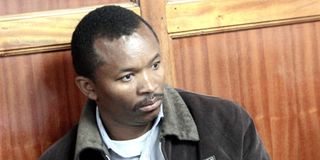Why Willie Kimani murder suspect wants DNA evidence expunged

Peter Ngugi, a police informer and one of the accused persons in the murders of lawyer Willie Kimani, Josphat Mwenda and taxi driver Joseph Muiruri.
What you need to know:
- Mr Ngugi said the police failed to comply with the law that governs collection of DNA samples.
- The accused's lawyer says the procedure of collecting the DNA samples from Mr Ngugi was procedurally flawed.
One of the five suspects in the murder case of human rights lawyer Willie Kimani has asked the High Court to expunge DNA evidence, which he claims was irregular obtained.
Mr Peter Ngugi told the High Court in Milimani, Nairobi that the police failed to obtain his consent before collecting DNA samples.
Through lawyer Kelvin Michuki, Mr Ngugi said the police failed to comply with the law that governs collection of DNA samples from criminal suspects, hence the evidence obtained is inadmissible in court.
The lawyer said Chief Inspector Robert Owino from the Directorate of Criminal Investigations (DCI) failed to comply with the mandatory provisions of section 122 A and 122 C (1) of the penal code.
According to the lawyer, the procedure of collecting the DNA samples from Mr Ngugi was procedurally flawed and the court should not rely on the report compiled by the government chemist.
He said nothing in the report shows on what authority the samples of buccal swabs were taken from his client.
“There is no written order by Chief Inspector Owino, yet in his own affidavit he indicates that he did not need to order for the same. He says the accused person consented to it,” said the lawyer, while denying his client gave consent.
He told the court that on August 29, 2016 when the samples were collected, Mr Ngugi was in police custody and the police had a duty to indicate how he was escorted from remand, his transmission to the Directorate of Criminal Investigations and later to the Government Chemist.
Cigarette butts
“The police officer said he took him from the cells and back. The court should find that the evidence cannot be relied on. Using it is against fair trial,” said Michuki.
The court also heard that the report does not indicate the DNA profiles were generated in relation to who or to which case.
“Taking of any samples is an issue that curtails rights of an accused person. Any provision that seeks to curtail that right must be interpreted in a manner that ensures the right is curtailed reasonably as per the expressed provisions of Article 24(1) of the constitution,” said the lawyer.
Mr Ngugi’s DNA profile was generated as police sought to link the five suspects with the cigarette butts that were found at the scene of the murder in Machakos.
Laboratory analysis of four cigarette butts placed Mr Ngugi, who was a police informer, at the crime scene. The DNA profile generated from the butts matched Mr Ngugi's.
The exhibit was taken to the laboratory by investigators on diverse dates between July and August in 2016.
DNA Sampling
However, the prosecution, led by Deputy Director of Public Prosecutions Nicholas Mutuku, opposed the application, saying DNA sampling was done as provided for in law.
Affidavits of two police officers, Chief Inspector Owino and Laboratory Technologist Lucy Wachira from the Government Chemist, indicate that it was explained to the suspect that he was required to undergo a DNA procedure.
Mr Owino said he told the suspect that the procedure could either confirm or disapprove that he was involved in the murder.
“The suspect understood and did not object. I ordered SGT Clemet Mwangi and CPL Nicholas Ole Sena to escort the suspect to the Government Chemist laboratory for the DNA sampling,” said Mr Owino in the affidavit.
By then Owino was attached to the Flying Squad Unit.
The other four accused persons are Administration Police officers Senior Sergeant Fredrick Leliman, Sergeant Leonard Mwangi, Constable Silvia Wanjiku and Corporal Stephen Chebulet.
They are accused of killing the human rights lawyer, his client Josephat Mwenda and driver Joseph Muiruri in 2016.
Hearing of the case resumes tomorrow morning pending ruling by Justice Jessie Lessit on Mr Ngugi’s application.




